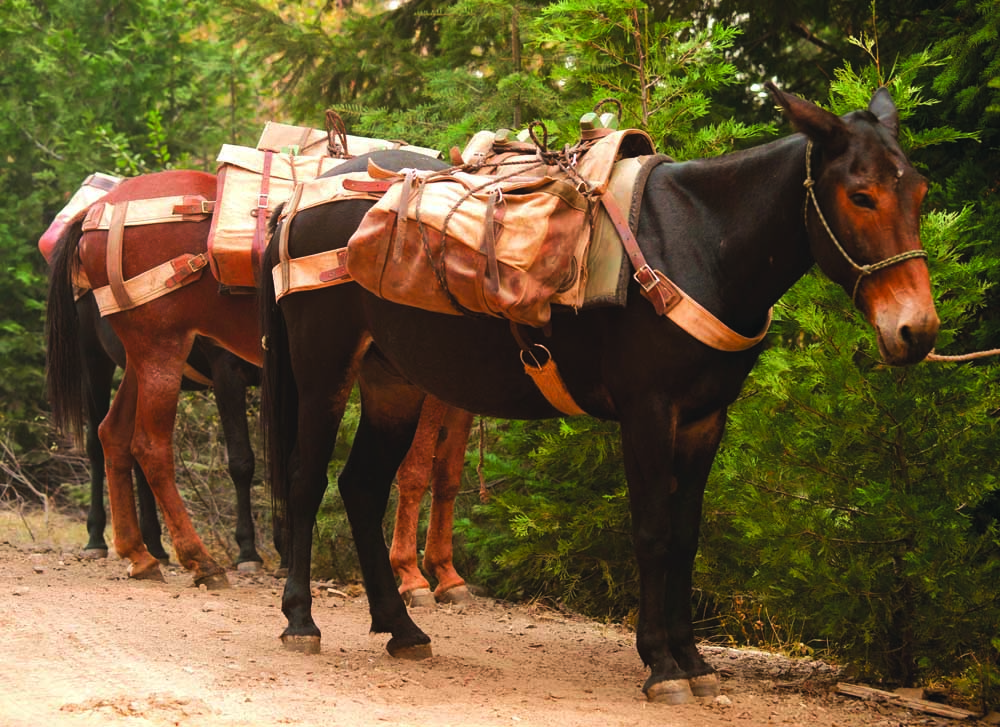Illegal hunting guides forfeit mules after multistate probe
Published 7:00 am Wednesday, September 21, 2022

- Two Oregon men were convicted of illegally guiding hunting parties and two of their six pack mules were seized as part of their penalty, according to a press release from Oregon State Police Fish and Wildlife.
ENTERPRISE —Two Oregon men convicted of illegally guiding hunters in Wallowa County forfeited mules and gear, among other penalties, following a multistate investigation, according to a Sept. 19 press release.
David H. Ravia, 69, from Dayton, and Caleb L. Richmond, 48, from McMinnville, guided out-of-state hunters in Hells Canyon National Recreation Area for at least the past 10 years, according to Oregon State Police Fish & Wildlife Lt. Ryan Howell. A complaint led to an investigation and subsequent charges in a case that spanned two years and stretched from Oregon to Ohio and Michigan.
On June 16, 2021, Caleb Richmond pled guilty to five counts of failure to register as an outfitter/guide. He must pay fines and serve 24 months bench probation, which includes a prohibition on hunting, guiding and possession of firearms while camping; serve 80 hours of community service; and issue a letter of apology to hunters and guides.
On April 6, 2022, David Ravia pled guilty to three counts of failure to register as an outfitter/guide. He must pay fines and serve 24 months bench probation, which includes a prohibition on hunting, guiding, and possession of firearms while camping; serve 80 hours of community service; and issue a letter of apology to hunters and guides. Ravia also forfeited the evidence seized in the case, including pack bags, a chain saw and saddles.
Eventually, two of six mules involved in the case were definitively linked to the crimes and seized. They are now the property of ODFW, where they might be used in the high-lakes fish-stocking program, according to ODFW wildlife biologist Phillip Perrine.
The illegal guide activity included multiple counts of guiding hunters without having a guide license. Their clients were often from out-of-state, which elevated the case to the federal level and involved the U.S. Fish and Wildlife Service along with OSP Fish and Wildlife troopers and the Michigan and Ohio departments of natural resources. Along with multiple jurisdictions, the case involved a variety of investigation tactics, including on-the-ground surveillance to determine methods and equipment involved in the crimes.
According to the press release, the pair instructed clients to say they were just friends, not guides, if anyone asked.
Law enforcement officials served a warrant at Ravia’s home in Dayton and interviewed residents in Ohio and Michigan on Aug. 27, 2019. At the same time, OSP Fish and Wildlife troopers apprehended and served search warrants on Ravia and Richmond at a trailhead as they led a pack string of six mules carrying hunters and gear toward their remote camp, according to Howell.
Licenses for guides serve several purposes, according to Cyndi Bolduc, Outfitter Guides Program coordinator with the Oregon State Marine Board, which has oversight of guide and outfitter activities. Guides must prove they are adequately insured and bonded, have basic first-aid and CPR skills, carry the required safety equipment and agree to conduct themselves according to ethical and professional standards.
An annual Oregon hunting guide and outfitter license costs $150 for residents. Outfitters must provide a $5,000 surety bond if they accept pre-payments from clients. Those who skirt the rules skip out on paying license fees, and may reap other rewards, according to Bolduc. For instance, taking animals illegally may deprive legitimate guides and outfitters hunting in the same area. But remote camps and out-of-state clients mean that investigations into illegal guides can take years.
The case activated a new Turn In Poachers reward program directed by the Oregon Outfitter Guide Association, according to law enforcement.
This July, the Marine Board started a new TIP Line reward program modeled after current programs managed by the Oregon Hunters Association and the Oregon Wildlife Coalition. Tipsters who call in illegal guide activity can earn $200 if their tip leads to an arrest or citation. In 2021, the Hunters Association handed out nearly $11,000 in rewards, and ODFW issued 178 hunter preference points for callers whose tips lead to an arrest or citation.
The tipsters who reported the guides’ illegal activities to OSP’s Fish & Wildlife Division each received a $200 reward after the two men were charged and convicted, according to law enforcement officials.
The Stop Poaching Campaign educates the public on how to recognize and report poaching. This campaign is a collaboration among state agencies, hunters and other conservationists, landowners, and recreationists to engage the public in combatting Oregon’s poaching problem. For more information, visit https://dfw.state.or.us/stop-poaching/.
A phone call from the Chieftain seeking more information about the case was not immediately returned Monday.

